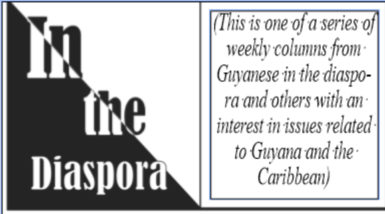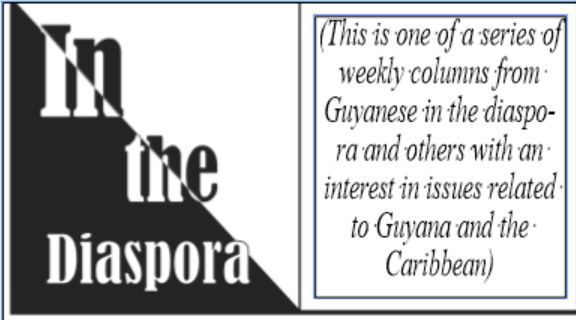By Frank Birbalsingh

Sharon Maas, The Girl from the Sugar Plantation, Bookouture, Ickenham, United Kingdom, 2017, pp.335.
Sharon Maas who is of Dutch-Caribbean-Amerindian ancestry, was born “Sharon Westmaas” in Georgetown, British Guiana (now Guyana) where her mother Eileen Cox was a pioneering feminist, crusading journalist and consumer advocate, while her father David Westmaas was Press Secretary to Dr. Cheddi Jagan who later became President of Guyana, and her uncle Rory (David’s brother), became a leading light in Dr. Jagan’s People’s Progressive Party (PPP] in the 1950s. Maas’s fertile imagination, versatile plot-making and superbly fluent writing are evident throughout her two fictional works The Lost Daughter of India and The Orphan of India, based on stories from the The Mahabharata, and seven novels, four of which, “The Quint Chronicles,” were written during an almost unbelievably short period between 2015 and 2017.
Previous novels in the “Quint Chronicles” portray brutish manners in British Caribbean, colonial, plantation societies that for centuries relied on forced African, slave labour within a social structure held together by a perverse parade of race, colour, class and ethnic criteria; but by the mid-nineteenth century, although slavery was abolished, and the freed Africans replaced by Indian, indentured, immigrant labourers, much of the old, master/slave culture of cruelty and brutality still persisted. These repugnant values are what form the social context in The Girl from the Sugar Plantation, fourth instalment of the Quint Chronicles in which imaginary events and characters mingle with historical persons and facts, from the 1930s to the 1960s, to consider the role in Guyanese history of two real-life individuals: Sir Jock Middleton Campbell, Head of Booker Brothers, a British Company that owned a majority of sugar plantations in Guyana, and Dr. Cheddi Jagan who was Premier and later President of Guyana..
Action in The Girl takes place in Georgetown, capital city of Guyana, and on a fictional plantation – Promised Land – where the narrator Mary Grace Smedley-Cox grows up. Mary Grace who is introduced as the adopted daughter of Johanna, the white owner of Promised Land and already deceased (white) Charles Smedley, is falsely told that her unnamed birth-mother was a mixed-blood plantation worker who died in childbirth. But such secrecy in racial attitudes begin to change in The Secret Life of Winnie Cox – third novel of the Quint Chronicles – where Mary Grace’s aunt, Winnie Cox, sister of Johanna, violates the most sacred taboo of her family’s historic, ethnic purity by venturing into desperate, often hilarious escapades during a daring elopement that leads to her marriage to George Quint, a common, African-Guyanese postman.
After the death of her husband in a labour protest, Winnie Cox again appears in The Girl as mother of eight grown up, mixed-blood, Quint sons, in Georgetown, where she also serves as confidante to Mary Grace during the latter’s romantic association with Jock Campbell. The author’s deft interweaving of stages in the romantic relationship between Mary Grace and Jock, or between steps in Jock’s career as a Booker business tycoon, splendidly illustrates her legendary plot-making skill. The romantic relationship itself is lavishly described and intricately probed until it blossoms into thoughts of approaching marriage. There are also twists and turns in the story, for instance, taking in poorer, more revolutionary members of the narrator’s family, or revealing Johanna as Mary Grace’s real mother and George Quint as her true father, all of which transform Mary Grace into an authentic Quint, and the sons of George Quint and Winnie Cox – formerly mere cousins – into warmly welcomed brothers.
The plot further thickens when Mr. Foot, a British character and former Booker employee who had earlier been dismissed by Jock and had returned to Britain, now, out of sheer spite, informs Jock’s parents that he [Jock] is “bringing down the [Booker] business” by “siding with communists” and implementing liberal policies. Worst of all, Foot discloses the plan of marriage between Jock and Mary Grace which Jock’s snobbish parents instantly forbid and spark sensational changes, for instance, Jock marries a British woman whom we never see; and Mary Grace marries a fellow Guyanese who dies in World War Two. Then, upon his return to Guyana as Director of Bookers, Jock introduces altruistic reforms in Bookers’ businesses and, somewhat adventitiously, Jock and Mary Grace have one final, sexual tryst after which she becomes pregnant and moves to England to settle down as a music teacher along with her young daughter.
Jock’s most radical attempted reform is an offer to Dr. Jagan, the Premier: “I’ll give you fifty-one percent of Booker shares. You, the government, holds those shares in trust with the unions. Bookers retain forty-nine percent of the shares and manage the whole enterprise.” (p.322) If Dr. Jagan’s spontaneous reply: “You’re joking, of course” (p.322) sounds curt or dismissive, it is no more so than the narrator’s justification for her failed marriage plan with Jock: “History had to be made, and our love must take second place. He [Jock] could not risk the future for a private, selfish desire.” (p.270)
In writing to Mary Grace about Jock’s offer, Winnie Cox comments: “outlandish… made no sense whatsoever… in the end Jock’s a capitalist and Bookers the quintessential capitalist concern.” (p.324) Also, nearly ninety percent of Maas’s novel focuses either on Jock’s abortive love relationship with Mary Grace, or his reformist policies of corporate benevolence in Guyana – an excessive emphasis on Jock probably influenced by the author’s over-zealous reading of Professor Seecharan’s biography of Jock Campbell; for reservations about Jock’s reformist zeal appear, for instance, both in Professor Seecharan’s biography itself, and in Harold Drayton’s recent memoir An Accidental Life, hinting at Jock’s possible role in the British decision to suspend the constitution and invade Guyana, in 1953. Reform is acknowledgement of debt rather than benevolence; and maybe it should not be rejected; but if we consider the hideous history of Guyanese plantations, it is certainly not right to think of reform, or corporate benevolence as anything more than a discharged debt far too long delayed.

